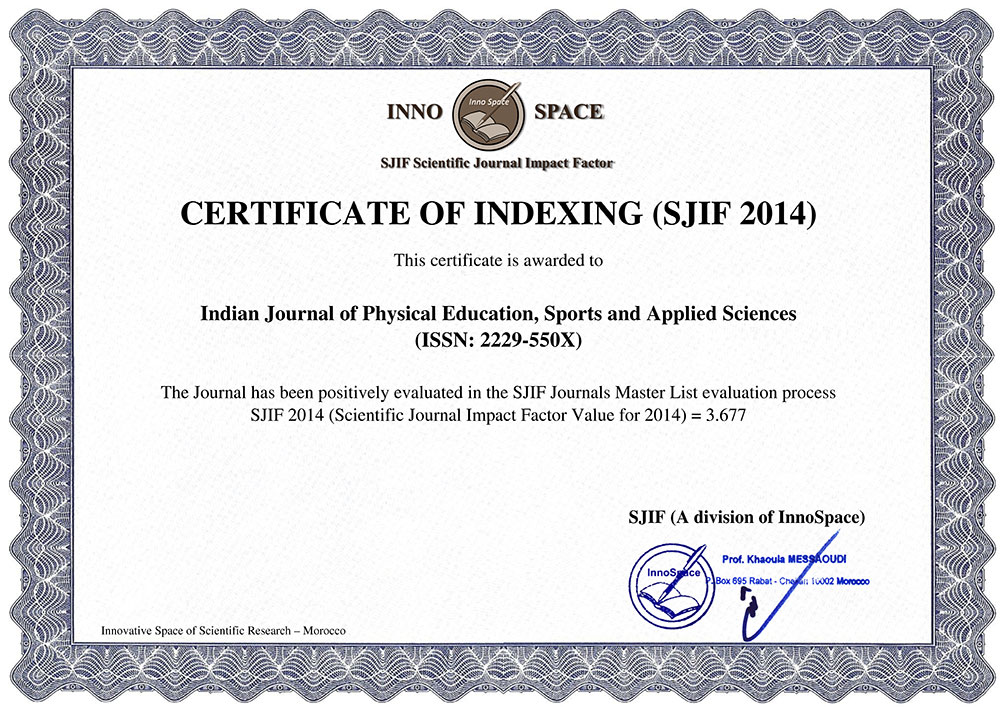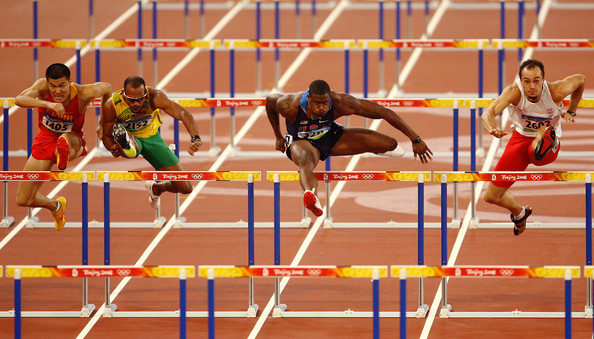A COMPARISON OF SELECTED ANTHROPOMETRIC MEASURES BETWEEN STATE AND NATIONAL LEVEL MALE VOLLEYBALL PLAYERS
2021, January, Volume 11-Number 1 February 8, 2021| Author name : | Shankarappa C.1 & Dr. S. V. Arun2 | ||||
|---|---|---|---|---|---|
| Page no : | 36-43 | Volume : | 11 | Issue : | 1 |
doi no.: 05-2016-44975451, DOI Link :: http://doi-ds.org/doilink/02.2021-52779156/IJPESAS/2021/JAN/V11/I1/A7
Shankarappa C.1 & Dr. S. V. Arun2
Affiliations:
1 Ph.D Scholar, Physical Education, Sre Manjunatha Swamy First grade college, Saraswathi Nagar, Devangere, Bengaluru, (Karnataka), 9035955478, Mobile-cshankardvg@gmail.com
2 Director of Physical Education, C.Kandaswami Naidu College for Men, Chennai 600102 gpsmphd@gmail.com
ABSTRACT
Human bodies are widely divergent in their size shape and compositional characteristics. It would therefore seem that the full anthropometric description of human physique would require –the assessment of a great number of body, bodily dimensions. The purpose of study was to compare and investigate the selected anthropometric measures of state and national level male volleyball players. Forty three state and national levels (State level = 22, national level =21) male volleyball players who represented their respective district and state teams in respective competitions , Male players ranging between 19 to 25 years of age, All the participants were tested on selected six parameters of anthropometric measures i.e. Waist Circumference, Hip Circumference, Middle Upper arm Circumference, waist to hip ratio, waist to height ratio and Body composition. To assess the anthropometric parameters of state and national levels male volleyball players, means and standard deviations t-ratios were computed. To check t- Ratio, level of significant was set at .05 level. The results of study revealed the dissimilarity existed between state and national level male volleyball players in their waist circumference, middle upper arm circumference, WHR and WHtR and \Similarity in hip circumference and body composition It was also concluded that selected anthropometric characteristics had positive impact on the competition levels of the male volleyball players.
Key Words: Male, Volleyball players, state level, national level, anthropometric measures.
DOWNLOAD FULL TEXT: 
BIBLIOGRAPHY
Adhikari, H I. & Bankura, R. S. (1986), Modern perspectivfes in physical education and sport science Harnam Publication Delhi.
Bose, Sahil Kumar & Banerjee A K. (1987), “Morphological profile of champion Indian school – footballers” NIS Scientific Journal, 10 (3) : 33.
Bhatnager, D.P. and Singal, P. (1986), “A Comparative Study of Athletes and Volleyball Players from Rural Area of Assam and Madhya Pradesh,” Modem Perspectives in Physical Education and Sports Sciences: Hamam Publications, 117-123.
Ercolessi D. La caduta dal salto (1999), Super Volley, 1: 79-82.
Gaurav V, Singh M, Singh S.(2010), Anthropometric characteristics, somatotyping and body composition of volleyball and basketball players. Journal of Physical Education and Sports Management, 1(3): 28-32.
Hebblinck, M. (1985), “Selected Anthropometric characteristics ot montreal Olympic Athletes” Journal of Sports Physical Education and Sports Science, 8-2) : 1.
Heyward, V.H. (2006), Advanced fitness assessment and exercise prescription. (5th ed.). Champaign, IL: Human Kinetics.
Johan, W., Lay O’ McPharson and Kenyon, Gerald (1978), Sports and Social System (London: addition Wesley Publishing Company Inc. p.3.
Jankovic V, Marelic N. Odbojka(1995), Volleyball, Faculty of Physical Education, Zagreb, pp.7-9.
Keogh, J. (1999), The use of physical fitness scores and anthropometric data to predict selection in an elite under-18 Australian rules football team. Journal of sport Science and Medicine, 2:125-133.
Ozkan, Hayri (1984), “Physical, Physiological and Motor Skill Determinants in Male High School Soccer players” Dissertation Abstract International , 45:786-A.
Philips, Allen and Harnok, James E. (1979), Measurement and Evaluation in Physical Education, New York: John Willey & Sons, p.223
Rieckehoff, German (1977), The Purpose of Sports, Olympic Review 118 : 471.
Sidhu, L. S., Grewal, R. and Verma, S. K. (1984), ”Positional Differences in Physique and Body Composition Among Top Level Indian Women Hockey Players” Journal of Sports Medicine Physical Fitness 24 : 337-341.
Sidhu, L. S., Grewal, R. and Verma, S. K. (1984), ”Positional Differences in Physique and Body Composition Among Top Level Indian Women Hockey Players” Journal of Sports Medicine Physical Fitness 24 : 337-341.
sidhu, S.S. Sodhi, H.S. (1995), “Body Size of Elite Volleyball Players of India and many other High Ranking Countries,” Journal of Sport and Sports Sciences 18 (2) : 41-52.
Ugarkovic D. (2004), Biomedicinskeosnovesportske medicine (Biomedical foundations of sports medicine). Novi Sad.
Wilmore, J.H., and Costill, D.L. (1999), Physiology of Sports and Exercise. 2nd ed. Champaign, Human Kinetics.







